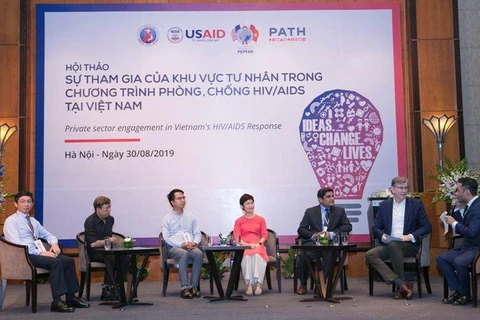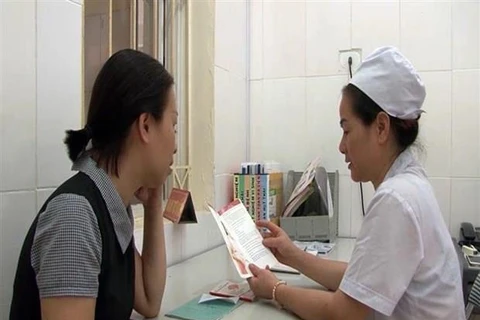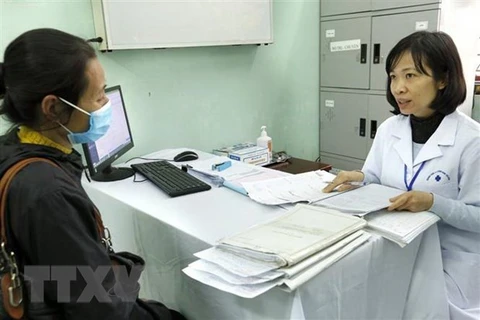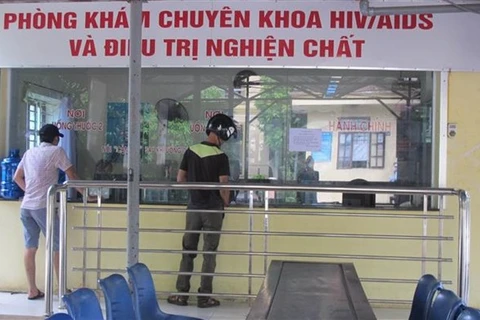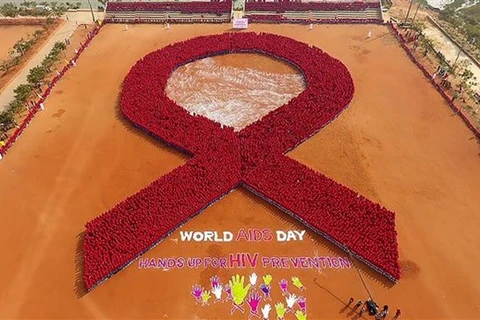Hanoi (VNA) – The fight against HIV/AIDS has always been a priority of Hanoi, Vice Chairman of the municipal People’s Committee Le Hong Son said at a meeting on November 29 in response to the World AIDS Day (December 1).
Hanoi is facing many difficulties in working towards the 90-90-90 goals and ending the AIDS pandemic by 2030. The 90-90-90 goals mean by 2020, 90 percent of all people living with HIV will know their HIV status, 90 percent of all people with diagnosed HIV infection will receive sustained antiretroviral therapy and 90 percent of all people receiving antiretroviral therapy will have viral suppression.
As of the end of October this year, Hanoi detected 28,421 HIV carriers, with 22,328 still alive. It is estimated that around 4,000 people have been diagnosed with HIV, but are yet to receive antiretroviral therapy. Social stigma and discrimination against HIV/AIDS patients still exist, which makes the patients hesitate to access HIV/AIDS prevention and treatment services.
Vice Chairman Son said People’s Committees of all districts and the Steering Committees for combating social evils (Committee 138) of all localities are required to build specific plans of actions to realize the goals related to HIV/AIDS.
He urged local authorities to create favourable conditions for community-based organisations to access high-risk groups, provide consultations and tests, persuade HIV carriers to receive treatment and reduce discrimination.
District administrations must allocate local budget to activities to prevent and fight HIV/AIDS, the official said.
UNAIDS Country Director Marie-Odile Emond said the city should take urgent action as gaps still remain in the fight against HIV/AIDS.
'Undetectable = Untransmittable' (U=U) is an important message that should be spread widely so that more people will join hands in the fight, she said. /.
Hanoi is facing many difficulties in working towards the 90-90-90 goals and ending the AIDS pandemic by 2030. The 90-90-90 goals mean by 2020, 90 percent of all people living with HIV will know their HIV status, 90 percent of all people with diagnosed HIV infection will receive sustained antiretroviral therapy and 90 percent of all people receiving antiretroviral therapy will have viral suppression.
As of the end of October this year, Hanoi detected 28,421 HIV carriers, with 22,328 still alive. It is estimated that around 4,000 people have been diagnosed with HIV, but are yet to receive antiretroviral therapy. Social stigma and discrimination against HIV/AIDS patients still exist, which makes the patients hesitate to access HIV/AIDS prevention and treatment services.
Vice Chairman Son said People’s Committees of all districts and the Steering Committees for combating social evils (Committee 138) of all localities are required to build specific plans of actions to realize the goals related to HIV/AIDS.
He urged local authorities to create favourable conditions for community-based organisations to access high-risk groups, provide consultations and tests, persuade HIV carriers to receive treatment and reduce discrimination.
District administrations must allocate local budget to activities to prevent and fight HIV/AIDS, the official said.
UNAIDS Country Director Marie-Odile Emond said the city should take urgent action as gaps still remain in the fight against HIV/AIDS.
'Undetectable = Untransmittable' (U=U) is an important message that should be spread widely so that more people will join hands in the fight, she said. /.
VNA
